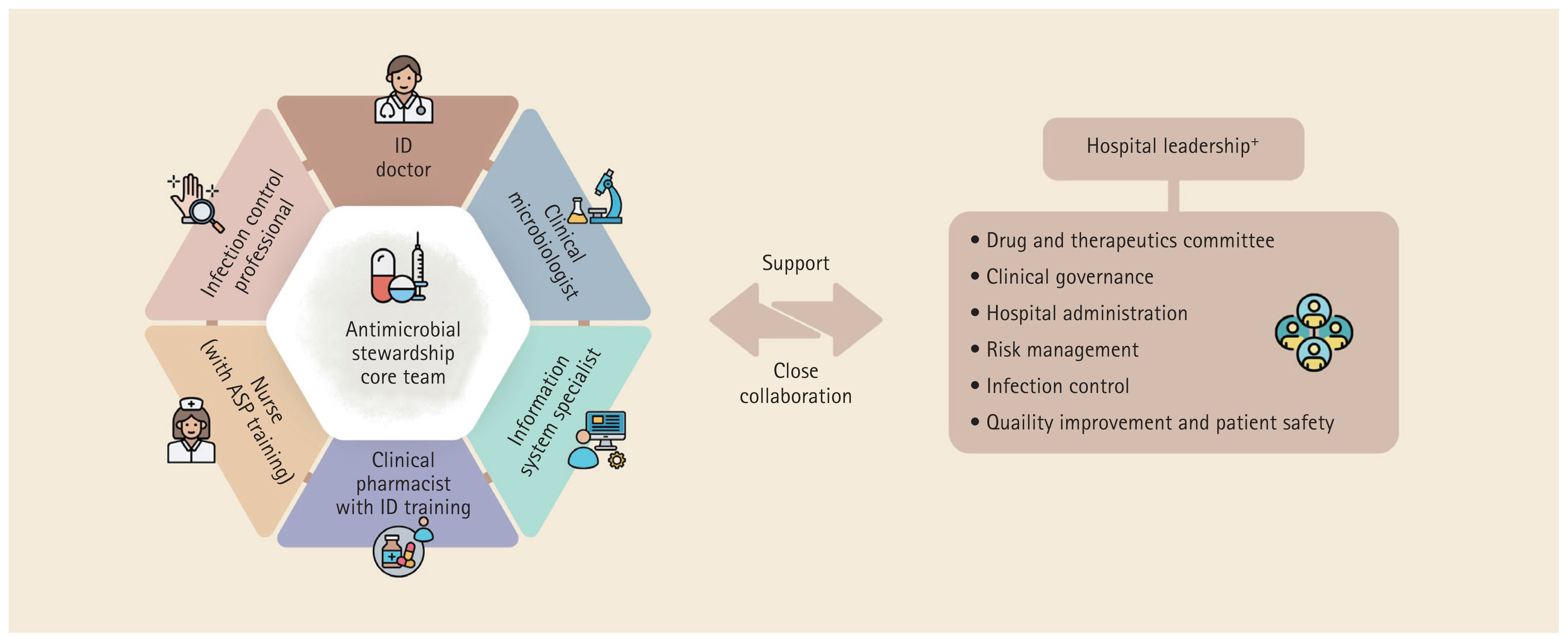3. Antimicrobial Resistance Collaborators. Global burden of bacterial antimicrobial resistance in 2019: a systematic analysis. Lancet 2022;399:629–655.


4. Kim YA, Park YS, Youk T, Lee H, Lee K. Trends in South Korean antimicrobial use and association with changes in
Escherichia coli resistance rates: 12-year ecological study using a nationwide surveillance and antimicrobial prescription database. PLoS One 2018;13:e0209580.



6. Cunha CB. Antimicrobial stewardship programs: principles and practice. Med Clin North Am 2018;102:797–803.

9. O’Neill J. Review on antimicrobial resistance (AMR): tackling drug-resistant infections globally: final report and recommendations [Internet] London: AMR Review, c2016. [cited 2023 Nov 8]. Available from:
https://amr-review.org/.
12. World Health Organization. Health and economic impacts of antimicrobial resistance in the Western Pacific Region 2020–2030 [Internet] Geneva: World Health Organization, c2023. [cited 2023 Nov 8]. Available from:
https://www.who.int/publications/i/item/9789290620112.
13. Song KH, Kim CJ, Choi NK, et al. Clinical and economic burden of bacteremia due to multidrug-resistant organisms in Korea: a prospective case control study. J Glob Antimicrob Resist 2022;31:379–385.


15. Fleming-Dutra KE, Hersh AL, Shapiro DJ, et al. Prevalence of inappropriate antibiotic prescriptions among US ambulatory care visits, 2010–2011. JAMA 2016;315:1864–1873.


16. Kim YC, Park JY, Kim B, et al. Prescriptions patterns and appropriateness of usage of antibiotics in non-teaching community hospitals in South Korea: a multicentre retrospective study. Antimicrob Resist Infect Control 2022;11:40.


17. Park SY, Moon SM, Kim B, et al. Appropriateness of antibiotic prescriptions during hospitalization and ambulatory care: a multicentre prevalence survey in Korea. J Glob Antimicrob Resist 2022;29:253–258.


18. Park SY, Kim YC, Lee R, et al. Current status and prospect of qualitative assessment of antibiotics prescriptions. Infect Chemother 2022;54:599–609.


19. Ryu S. The new Korean action plan for containment of antimicrobial resistance. J Glob Antimicrob Resist 2017;8:70–73.


26. Liu C, Yoon EJ, Kim D, et al. Antimicrobial resistance in South Korea: a report from the Korean global antimicrobial resistance surveillance system (Kor-GLASS) for 2017. J Infect Chemother 2019;25:845–859.


28. Kim B, Lee MJ, Moon SM, et al. Current status of antimicrobial stewardship programmes in Korean hospitals: results of a 2018 nationwide survey. J Hosp Infect 2020;104:172–180.


29. Park SY, Chang HH, Kim B, et al. Human resources required for antimicrobial stewardship activities for hospitalized patients in Korea. Infect Control Hosp Epidemiol 2020;41:1429–1435.


30. Lee MJ, Moon SM, Kim B, et al. Status of antimicrobial stewardship programmes in Korean hospitals including small to medium-sized hospitals and the awareness and demands of physicians: a nationwide survey in 2020. J Glob Antimicrob Resist 2021;26:180–187.


33. Cho S, Kim C, Kim SH, et al. Institutional-specific smartphone application as a supplemental tool for an antimicrobial stewardship program in 2 large community-based hospitals: Acceptance of physicians and pharmacists. J Am Pharm Assoc (2003) 2023;63:967–975e1.


37. World Health Organization. One Health approach to AMR mitigation and safer food in the Asia-Pacific Region. Geneva.
38. Mesa Varona O, Chaintarli K, Muller-Pebody B, et al. Monitoring antimicrobial resistance and drug usage in the human and livestock sector and foodborne antimicrobial resistance in six European countries. Infect Drug Resist 2020;13:957–993.


39. Kim S, Kim H, Kim Y, Kim M, Kwak H, Ryu S. Antimicrobial resistance of
Escherichia coli from retail poultry meats in Korea. J Food Prot 2020;83:1673–1678.



40. Kim DW, Cha CJ. Antibiotic resistome from the One-Health perspective: understanding and controlling antimicrobial resistance transmission. Exp Mol Med 2021;53:301–309.


41. Hong JS, Song W, Park HM, et al. Clonal spread of extended-spectrum cephalosporin-resistant
Enterobacteriaceae between companion animals and humans in South Korea. Front Microbiol 2019;10:1371.


44. Lee H, Yoon EJ, Kim D, et al. Antimicrobial resistance of major clinical pathogens in South Korea, May 2016 to April 2017: first one-year report from Kor-GLASS. Euro Surveill 2018;23:1800047.

45. Kim D, Yoon EJ, Hong JS, et al. Major bloodstream infection-causing bacterial pathogens and their antimicrobial resistance in South Korea, 2017–2019: phase I report from Kor-GLASS. Front Microbiol 2022;12:799084.

47. Góchez D, Raicek M, Pinto Ferreira J, Jeannin M, Moulin G, Erlacher-Vindel E. OIE annual report on antimicrobial agents intended for use in animals: methods used. Front Vet Sci 2019;6:317.

48. Hayashi Y, Paterson DL. Strategies for reduction in duration of antibiotic use in hospitalized patients. Clin Infect Dis 2011;52:1232–1240.

49. Nedved A, Lee BR, Hamner M, Wirtz A, Burns A, El Feghaly RE. Impact of an antibiotic stewardship program on antibiotic choice, dosing, and duration in pediatric urgent cares. Am J Infect Control 2023;51:520–526.


50. Oliver NT, Skalweit MJ. Outpatient parenteral antibiotic therapy in older adults. Infect Dis Clin North Am 2023;37:123–137.






 PDF Links
PDF Links PubReader
PubReader ePub Link
ePub Link Full text via DOI
Full text via DOI Download Citation
Download Citation Print
Print





